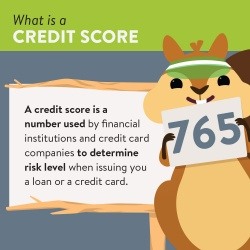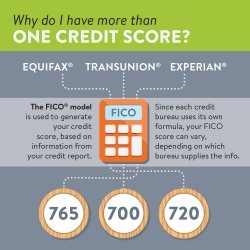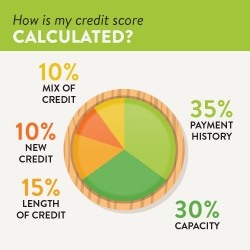You’ve likely heard about credit scores before (thanks to all those commercials with terrible jingles), but what do you actually know about them? How long have they been around? And what’s the deal with checking them?
A credit score is a number (usually between 300 and 850) that represents your creditworthiness. It’s a standardized measurement that financial institutions and credit card companies use to determine risk level when considering issuing you a loan or a credit card. Basically, it provides a snapshot of how likely you are to repay your debts on time. Widespread use of credit scores has made credit more widely available and less expensive for many consumers.
The credit scoring system that we’re familiar with today has been around since the 1980s. Before then, there was no standardized way to measure creditworthiness, so it was up to individual lenders to make judgment calls on whether or not to loan money to someone. The old system was time-consuming, inconsistent and quite biased, so a credit scoring system was introduced.
 The FICO® Score is the best known and most widely used credit score model in North America. It was first introduced in 1989 by FICO, then called Fair, Isaac and Company. The FICO Score model is used by the vast majority of banks and credit grantors, and is based on consumer credit files from the three national credit bureaus: Experian, Equifax and TransUnion. Because a consumer's credit file may contain different information at each of the bureaus, FICO scores can vary, depending on which bureau provides the information to FICO to generate the score.
The FICO® Score is the best known and most widely used credit score model in North America. It was first introduced in 1989 by FICO, then called Fair, Isaac and Company. The FICO Score model is used by the vast majority of banks and credit grantors, and is based on consumer credit files from the three national credit bureaus: Experian, Equifax and TransUnion. Because a consumer's credit file may contain different information at each of the bureaus, FICO scores can vary, depending on which bureau provides the information to FICO to generate the score.
When credit scores were first introduced, they were used primarily for loaning money. Today, credit scores have much more pull, and that’s why it’s important to understand how they’re calculated. Your monthly car payments, your ability to snag that sweet apartment and even the hiring manager’s decision on that new job you applied for can all be influenced by your credit score.
 A very good (740-800) or exceptional (800+) credit score means you’re in good shape. Scores under 580 are considered poor and mean you could be turned down for a loan. Scores in the fair-to-good range (580 to 670) might get you loan approval, but your interest rates will be higher than if you had an exceptional credit score. Nobody likes the idea of paying more money for no reason, so it makes sense to adopt credit habits that will boost your overall score.
A very good (740-800) or exceptional (800+) credit score means you’re in good shape. Scores under 580 are considered poor and mean you could be turned down for a loan. Scores in the fair-to-good range (580 to 670) might get you loan approval, but your interest rates will be higher than if you had an exceptional credit score. Nobody likes the idea of paying more money for no reason, so it makes sense to adopt credit habits that will boost your overall score.
Taking the time to familiarize yourself with how credit scores are calculated is the first step in getting a strong score. Each credit bureau uses a slightly different calculation, but the basic breakdown goes like this:
- 35% is based on payment history. Making payments on time boosts your score.
- 30% is based on capacity. This is one of the areas where the less you use of your total available credit, the better. If you get close to maxing out all your credit cards or lines of credit, it tanks your score, even if you’re making your payments on time.
- 15% is based on length of credit. Good credit habits over a long period of time raise your score.
- 10% is based on new credit. Opening new credit cards (this includes retail credit cards) has a short-term negative effect on your score, so don’t open a whole bunch at once!
- 10% is based on mix of credit. Having a combination of different types of credit (like revolving credit and installment loans) boosts this part of your score. Credit cards are considered revolving credit, and things like car loans and mortgages are installment loans.

Curious about your credit report? You are entitled to free weekly credit reports from each of the major credit bureaus. Set seasonal calendar reminders so you can remember to check on your credit report throughout the year. Request yours online by visiting annualcreditreport.com.
When you receive your credit report, you’ll notice that it does not list your three-digit credit score. Despite this, it’s still a helpful reference because it serves as the basis of your credit score. If you know how a credit score is calculated, then you know how to look for factors on your credit report that might be influencing your score for better or for worse. It’s also an easy way to look at account openings, account closings and what your repayment history looks like.
To get access to your actual credit score, there’s often an extra fee involved (usually between $15 and $25). An alternative is to visit creditkarma.com. This service provides an estimate of your credit score for free. Just be aware that this score uses a different calculation than FICO does, so while it comes pretty close, it still won’t be exact.
Some commercials make it seem like credit scores are big, mysterious, randomly assigned numbers. But with a little research, a little patience and some good habits, you can influence your credit score in a positive way and not be caught off guard by a denied loan or an outrageous interest rate.

Was this information useful? Visit our It's A Money Thing home page for more quick videos and helpful articles to help you make sense of your money, one topic at a time! Check back, new topics will be introduced regularly.





 The FICO® Score is the best known and most widely used credit score model in North America. It was first introduced in 1989 by FICO, then called Fair, Isaac and Company. The FICO Score model is used by the vast majority of banks and credit grantors, and is based on consumer credit files from the three national credit bureaus: Experian, Equifax and TransUnion. Because a consumer's credit file may contain different information at each of the bureaus, FICO scores can vary, depending on which bureau provides the information to FICO to generate the score.
The FICO® Score is the best known and most widely used credit score model in North America. It was first introduced in 1989 by FICO, then called Fair, Isaac and Company. The FICO Score model is used by the vast majority of banks and credit grantors, and is based on consumer credit files from the three national credit bureaus: Experian, Equifax and TransUnion. Because a consumer's credit file may contain different information at each of the bureaus, FICO scores can vary, depending on which bureau provides the information to FICO to generate the score. A very good (740-800) or exceptional (800+) credit score means you’re in good shape. Scores under 580 are considered poor and mean you could be turned down for a loan. Scores in the fair-to-good range (580 to 670) might get you loan approval, but your interest rates will be higher than if you had an exceptional credit score. Nobody likes the idea of paying more money for no reason, so it makes sense to adopt credit habits that will boost your overall score.
A very good (740-800) or exceptional (800+) credit score means you’re in good shape. Scores under 580 are considered poor and mean you could be turned down for a loan. Scores in the fair-to-good range (580 to 670) might get you loan approval, but your interest rates will be higher than if you had an exceptional credit score. Nobody likes the idea of paying more money for no reason, so it makes sense to adopt credit habits that will boost your overall score.



